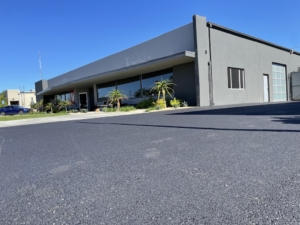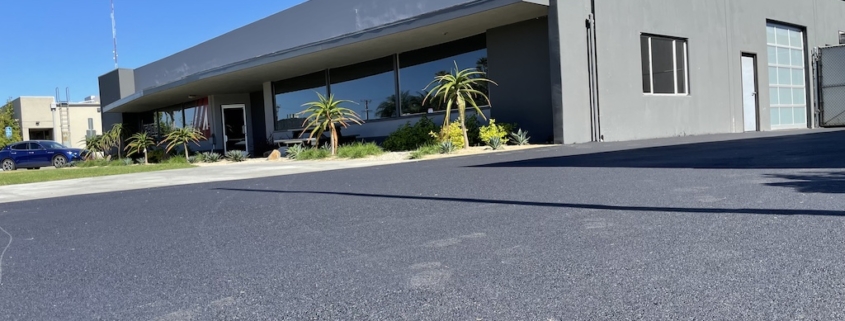What Is the Asphalt Paving Life Expectancy?
 There is an entire industry devoted to compiling statistical information about the life expectancy of many common home components and household appliances. For example, wood floors can last a century or more, aluminum gutters have a life expectancy of around 20 years, clothes dryers have an average life of 10 years, and a slate roof should last over 50 years. However, other items depend more heavily on their maintenance and use, so life expectancies tend to be stated as ranges. Modern refrigerators, for instance, have a life expectancy of six to 15 years, gas ovens last between 10 and 18 years, and a deck has a life expectancy range of eight to 30 years. Asphalt paving is another category in which the life expectancy is normally stated as a range because there are several factors that must be considered before assigning an estimated life.
There is an entire industry devoted to compiling statistical information about the life expectancy of many common home components and household appliances. For example, wood floors can last a century or more, aluminum gutters have a life expectancy of around 20 years, clothes dryers have an average life of 10 years, and a slate roof should last over 50 years. However, other items depend more heavily on their maintenance and use, so life expectancies tend to be stated as ranges. Modern refrigerators, for instance, have a life expectancy of six to 15 years, gas ovens last between 10 and 18 years, and a deck has a life expectancy range of eight to 30 years. Asphalt paving is another category in which the life expectancy is normally stated as a range because there are several factors that must be considered before assigning an estimated life.
What Factors Affect the Life Expectancy of Asphalt Paving?
Virtually everything that transpires during and after paving Orange County properties can impact a pavement’s useful life. These include:
1. The quality of the construction
2. The type of installation, i.e., an asphalt overlay or a new construction
3. The pavement’s use or abuse
4. The level of preventive maintenance the pavement receives
5. The promptness of any necessary repairs
How Does the Quality of the Installation Affect the Life Expectancy of Asphalt Paving?
There are several critical steps that an asphalt paving company must handle correctly to ensure a long-lasting pavement. These include the preparation of the subgrade, the correction of any potential drainage issues, the choice of asphalt type, the type of equipment used, the skills of the asphalt paving Orange County contractor and crew members, and the proper compaction of every layer of the structure.
Does an Asphalt Overlay Last Longer Than a New Pavement?
Actually, an asphalt overlay usually has a shorter life expectancy than most new pavements. Overlays can have a life expectancy of as little as 10 years, or they can last for as long as 20 years. It depends on the condition of the pavement prior to the overlay installation, the care the overlay receives, and the pavement’s use.
How Does Use Affect the Life Expectancy of an Asphalt Pavement?
Consider how long a carpet will last if no one ever walks on it compared to how long it will last if hundreds of people walk on it every day. Next, consider how much difference it could make if people are constantly spilling drinks on the carpet, walking on it while wearing wet or muddy shoes, or dropping food on it. The impact to the life expectancy of an asphalt pavement is similar; if no one ever drives, walks, or parks on the pavement, the life expectancy of the pavement increases. Conversely, if the pavement is constantly overloaded, poorly maintained, and never repaired, its life expectancy will decrease.
How Does Preventive Asphalt Maintenance Affect the Pavement’s Life Expectancy?
Sealcoating, routine cleanings, and other preventive maintenance procedures block or mitigate damage from the weather, the sun, automotive fluids, and certain types of abuse. In general, the less damage the pavement incurs, the longer it should last. Ask a reputable asphalt paving Orange County contractor to design a pavement or parking lot maintenance plan that is customized for your specific pavement and needs.
How Do Prompt Repairs Impact the Life of an Asphalt Pavement?
Cracks and potholes will continue to grow until they are repaired. Pavement breaks allow water, dirt, and automotive fluids to travel as far as the bottom layer of the structure, inflicting damage as they go. Prompt repairs can halt the progress of the damage, increasing the useful life of the pavement.
What Are the Estimated Life Expectancies of Different Types of Asphalt Pavements?
One of the first things that paving Orange County contractors learn is that no two pavements are identical in usage and care. Therefore, only your asphalt company can provide you with an accurate estimate of your pavement’s expected life. Here are the typical ranges for some common types of pavements:
• Highways normally need to be milled and an overlay installed 10 to 15 years after they were constructed or resurfaced.
• Parking lots can typically go 15 to 25 years between resurfacings.
• Home driveways can last more than 30 years, but most of them need to be resurfaced every 20 to 25 years.
• Urban streets can often go more than 20 years between overlays if they support primarily passenger vehicles.
If you have additional paving questions, feel free to contact Peterson Grading & Paving for answers. We are an experienced, reputable paving company serving Orange County and the entire state of California. Our services include concrete installations and repairs, asphalt resurfacing and paving, parking lot striping, asphalt repair, parking lot maintenance, sealcoating, ADA compliance, bollard installation, shot blasting, warehouse striping, marking removal, and parking lot signage. We are well-respected for our integrity, craftsmanship, customer service, and professionalism. Submit our online form if you are interested in a free quote, or you can email the information to Ryan@GradePave.com. You can also call our Orange County office at 949-402-6979.





Leave a Reply
Want to join the discussion?Feel free to contribute!